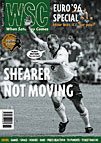 A view on the media and public reaction to Euro '96 in Bulgaria. Mark McQuinn and Boris Petrov report
A view on the media and public reaction to Euro '96 in Bulgaria. Mark McQuinn and Boris Petrov report
If ever a country needed a break, in terms of football success, it was Bulgaria at Euro ’96. The run up to the finals saw the country in a state of economic collapse with over 100 banks folding, 65 major industries being closed and people having to queue for hours each days to buy bread, as the government had exported most of the country’s wheat supply to bring in hard currency.
The finals were understandably seen by the media as the one cause for celebration. Euro ’96 took over the front pages of the broadsheets as well as the tabloids, while hour-long (non) programmes featuring the players training and, er, finishing training, appeared with almost as much regularity as the creaking British costume dramas that shore up the television schedules.
Meticulous profiles of every player in the squad were put together, including information about their favourite supermodel (Cindy Crawford trouncing the opposition), chewing gum (Turbo Mint coming out on top) and brand of cigarettes (Marlboro Lights winning easily here, although Stoichkov favours stronger stuff).
Full match re-runs of Bulgaria’s recent victories over Germany and France attracted huge television audiences and any fitness scares were broadcast in hushed, sombre tones. Politicians were a lot keener to talk about their support for the team than the economic situation and television and radio discussion programmes all turned into Euro ’96 previews, no matter what the topic was supposed to be.
The tone in the press was generally pugnacious, particularly towards Germany and France, since both were considered to have accepted defeat against Bulgaria with an annoying lack of grace.
As always the lion’s share of the media coverage was devoted to Stoichkov, who was memorably depicted on the front pages of one newspaper as a colossus striding through the centre of London with Big Ben tucked under his arm. His performances were warmly praised by all sections of the media, while his misdemeanours were brushed aside.
Scapegoats were inevitably needed once it all went wrong and the Penevs took the brunt. The only other serious candidate was British cuisine, which the media attacked with unswerving venom. Newspaper reports created the idea that fish, chips and varieties of stodge were all that was on offer, foodwise, in Britain.
The main debate in the media after the defeat by France centred on whether it was through nepotism or sheer stupidity that Dimitar Penev had allowed his nephew, Lubo, to remain on the pitch, after a performance so wretched that it requires a new piece of Ron Atkinson football-speak to do it justice.
The media’s tone in the wake of Bulgaria’s exit was funereal. “Everything is going wrong, and now even the footballers have let us down,” was how one national daily described the situation. Given the lack of anything optimistic to write about in the country, it wasn’t surprising that the media built up expectations about Euro ’96 to unrealistic proportions. The early exit left only gloom to report. With the team’s average age approaching thirty, it could be that the vociferous calls from the media for new blood to be introduced need to be heeded.
From WSC 114 August 1996. What was happening this month